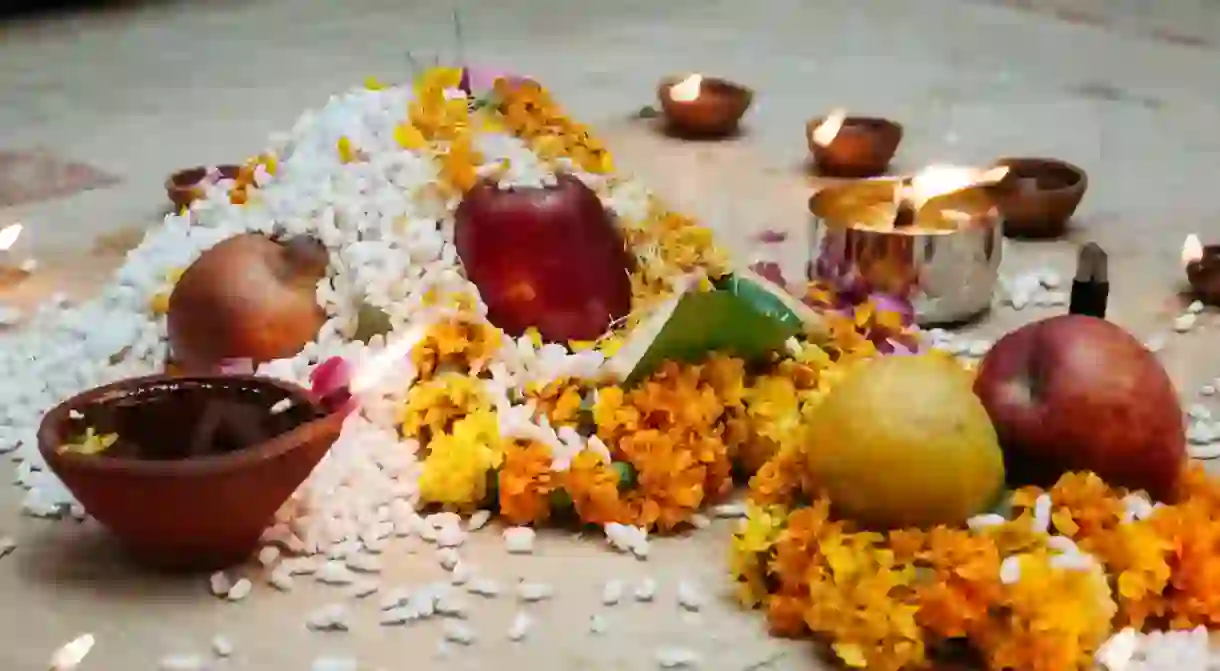Diwali Customs and Traditions You Should Know About

Diwali is one of the most celebrated festivals in India. Due to a large diaspora of Indians in other parts of the world like Trinidad, Tobago, Fiji, Singapore, and so on, Diwali is an official holiday in many parts of the world! Essentially, Diwali, or Deepavali, is the festival of light destroying darkness when good triumphs evil. Every Indian home prepares for Diwali in the ancient traditional ways and celebrates the festival with long-established customs. Here are some Diwali customs and traditions that you should know about.
What is Diwali?
One of the primary stories revolving around Diwali in Hindu mythology is that the day marks the return of Lord Rama, his wife Sita Devi and brother Lakshmana, to his homeland Ayodhya after 14 years spent in exile. To light the path for Rama, who had defeated the demon king Ravana, villagers use festive lights and other decorations. Reenactments of the Ramayana, the story of Lord Rama, are part of the celebrations in some areas.
The auspicious day is also considered to mark another victorious event in Hindu mythology. On this day, Lord Krishna is said to have defeated the demon Narakasura, who ruled Pragjyotishapura, which is considered to be near present-day Assam. To free the people of his kingdom, who lived in absolute fear, Krishna slayed the demon and declared that the day be marked with festivities.
Vedic scriptures mention the festival as Padma Purana, celebrated after the harvest season according to the Hindu calendar. Usually observed for five days, the first day of Diwali celebrations is called Dhanteras. In India, it is believed that buying jewelry (gold or silver) on this day is auspicious. The second day of Diwali is called Narak Chaturdasi, the 14th lunar day. Homes light 14 diyas to ward off evil. The third day is when Diwali is actually celebrated with family and 21 diyas are lit. On the 4th day, people celebrate Govardhan pooja, in remembrance of Lord Krishna who, in mythic tales, lifted Govardhan Hill to shelter the people in Vrindavan from heavy rain. The celebration ends with observing Bhai Dooj on the 5th day.


Festival of lights
True to its name as the festival of lights, Diwali marks the time when households across the country decorate their homes with lit diyas, or little clay lamps, and other festive lights. Buildings and streets are also illuminated with colorful lighting. Temples and public institutions, as well as individual households, celebrate by hosting spectacular firework displays.
The lights of Diwali are symbolic of the triumph of good over evil, of Lord Rama over Ravana, of Lord Krishna over Narakasura. In different parts of the country, effigies of both demon kings are burned in celebration.
House cleaning
It is an age-old norm to clean homes before Diwali. Indians believe that the Goddess Lakshmi only steps inside if your home is clean. This doesn’t just mean dusting the house. De-cluttering things, painting your house, and re-decoration is also a part of it, depending on your budget.

Shopping
Long before Diwali, the women in traditional families go shopping. It is the norm to wear new clothes on each day of celebration. It marks respect and excitement for the festivity. Men dress in traditional kurtas and, sometimes, dhoti, but it’s the women who steal the show! It’s the time of the year when women love to show off their new wardrobe collection.

Diwali sweets
Diwali is a time to let go of any diet regimes or exercise routines one has! The five days of celebration have loads of food, especially sweets! Chakli, peda, barfi, and laddoo are common during celebrations. Almost all sweets are made with broken pieces of dry fruits. As well as being a night full of songs, dance and fireworks, Diwali is marked by another much welcome tradition – that of gifting and enjoying mithai (sweets). Friends, family, neighbors and acquaintances exchange boxes of colorful delicacies, usually consisting of classic Indian sweets, such as ladoos, barfis, pedas and jalebis. Dried fruits, chocolates along with gluten-free and vegan options, also find their way into the boxes.


Rangoli
During the five days of celebration, people decorate their home with rangoli, a colorful artwork made with rice powder. Rangoli powder comes in many colors and the porch of one’s home is decorated with beautiful designs. It is is another way to ring in the festive spirit.


Exchanging gifts and playing cards
It is a tradition for families to exchange gifts during Diwali. The festival is one time in the year when families from all parts of the world reunite. Close and extended families pay visits at one another’s place for hours of banter, card playing, and gifts!


Celebrating the goddess of prosperity
Hindu Goddess Lakshmi is celebrated around the country during Diwali. The goddess of prosperity, fertility and wealth, she is said to have chosen Lord Vishnu, one of the most important deities in Hinduism, to be her husband on the night of Diwali.
Diwali around the world
Diwali celebrations span across the globe and are observed by Hindus and non-Hindus alike. In addition to India, the festival is an official holiday in Fiji, Guyana, Pakistan, Malaysia, Mauritius, Myanmar, Nepal, Singapore, Sri Lanka, Suriname, Trinidad and Tobago. The city of Leicester in the UK is said to host the world’s biggest Diwali celebrations outside of India.
Sikhism and Diwali
On the same day as Diwali, Sikhs celebrate Bandi Chhor Divas. It marks the day when Guru Hargobind, the sixth Sikh guru, freed himself from the Gwalior Fort where he was imprisoned. He arrived at the Golden Temple in Amritsar on this day. The Golden Temple is decorated with special lighting and hosts fireworks as well as other festivities to mark this special day.
Additional reporting by Sridevi Nambiar.













